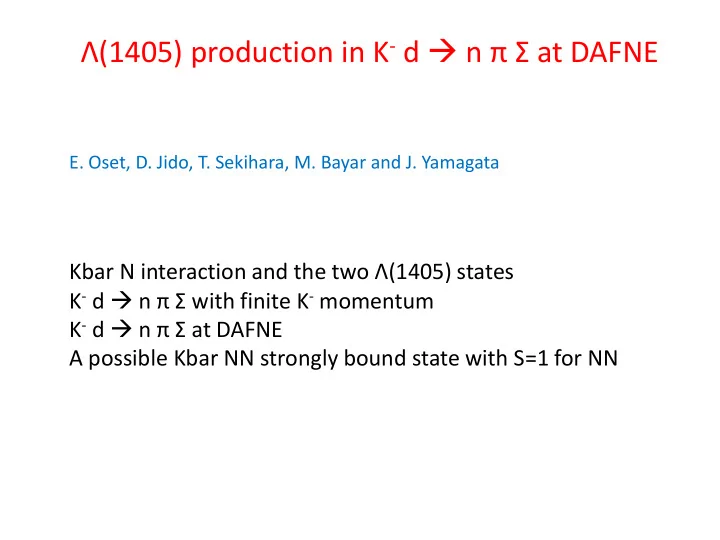

Λ (1405) production in K - d n π Σ at DAFNE E. Oset, D. Jido, T. Sekihara, M. Bayar and J. Yamagata Kbar N interaction and the two Λ (1405) states K - d n π Σ with finite K - momentum K - d n π Σ at DAFNE A possible Kbar NN strongly bound state with S=1 for NN
The Kbar N interaction is studied using chiral lagrangians and unitary techniques in coupled channels: Chiral Unitary Approach. Several resonances are dynamically generated, including two Λ (1405) states, from the interaction of the octet of pseudoscalar mesons and the octet of baryons: Kbar N, π Σ , π Λ , η Σ , η Λ , K Ξ Kbar N, π Σ are the most important channels for the Λ (1405) .
Poles of S=-1 J P =1/2 - Resonances Jido, Oller, Oset, Ramos, Meissner NPA03 X Є [0,1] Couples strongly to Kbar N Couples strongly to pi Sigma
Effect of coupling to the different states in different amplitudes
The nominal Λ (1405) has this mass, the theory says that if we excite the resonance induced by Kbar N we should mostly excite the narrow state around 1520 MeV …… Example of K - p π 0 π 0 Σ 0 , Prakhov ….. A new reaction to test it : K - d n π Σ , Λ (1405) is below Kbar N threshold ???????
Theory: Jido, Sekihara, E. O. Eur Phys J A 2009
Single scattering Double scattering The single scattering contributes mostly at large M inv corresponding to free K - p scattering with K - in flight
What happens if we decrease the K- momentum? Single scattering catches up S ingle scattering Double scattering and distorts the signal
DAFNE conditions: K coming from ф decay: Hope restored: measure Hopeless n in coincidence forward in CM (n from single scattering go backwards)
The signal of the Λ (1405) is predicted clearly around 1420-1425 MeV, like in Braun experiment. The cross sections obtained are measurable in a few months run, while data are collected for other purposes. Nevio Grion is planning the experiment.
Byproduct: can there be a strongly bound (not kaonic state) of K - d? The Kbar NN system has been thouroghly studied theoretically: Consensus that there is bound state. Differences in mass and width. B=10-70 MeV, Γ =50-110 MeV Experimentally: several claims, which have been disproved. No evidence, Γ too big??? All them search and find a state with S NN =0 which is the most bound. No one looked for S NN =1 , like K - d state.
Kbar NN scattering Fixed Center approximation to Faddeev equations M. Bayar, J. Yamagata, E. O . NN form factor
Explicit π Σ in three Kbar NN threhold: 2372 MeV body NN size of deuteron S NN =0 NN decreased size to about half radius from Hyodo et al. State bound by 45-50 MeV Γ around 50 MeV S NN =1 State bound by 30 MeV Γ around 50 MeV Extra widh from Kbar absorption
For S NN =0 the FCA provides results similar to those of Hyodo, Dote, Weise , since same input is used. Novel prediction for S NN =1, K - d strongly bound state. Not fund before because people used variational calculations to get minimum energy, or those who used Faddeev preassumed S NN =0. Experiments continue: the existence of new S NN =1 state might make the observation more difficult because overlap of two states. Theoretical confirmation with other methods welcome!!
Conclusions Mounting evidence that there are two Λ (1405) states The K - d n π Σ reaction with K - in flight gives evidence of the high energy, narrow Λ (1405) state DAFNE low energy Kaons still good, but neutrons forward must be measured in coincidence. Proposal planned. There is a strongly bound Kbar NN system, with S NN =1 like in d This is a novel theoretical finding since only S NN =0 has been investigated so far. Caveat with the width for experimental identification.
Recommend
More recommend